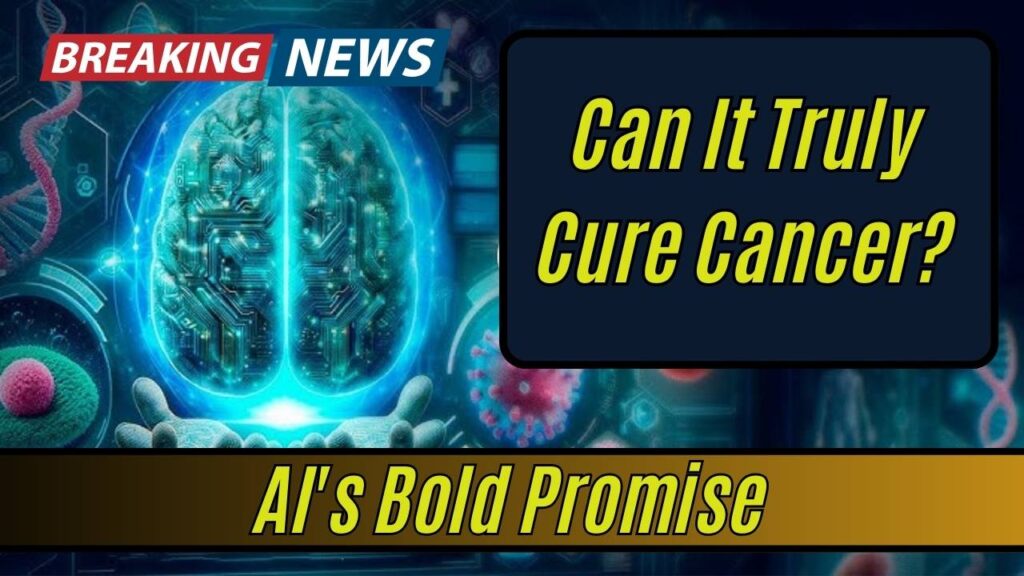AI’s Bold Promise – The idea that Artificial Intelligence (AI) could someday cure cancer has captured the imagination of scientists, healthcare leaders, and everyday people alike. As AI technologies evolve, their applications in cancer detection, personalized treatment, and drug discovery are becoming more powerful than ever. But can AI truly cure cancer—or is this promise still beyond our reach?

In this article, we’ll explore the exciting advancements AI is making against cancer, real-world success stories, the challenges still ahead, and what patients, caregivers, and healthcare professionals should realistically expect in the coming years.
AI’s Bold Promise
| Key Point | Details |
|---|---|
| Main Technology | Artificial Intelligence (AI) in cancer detection, treatment, and drug discovery |
| Major Breakthroughs | AI-driven blood tests, personalized treatment planning, faster drug discoveries |
| Accuracy Example | miONCO-Dx detects 12 cancers with 99% accuracy (The Times) |
| Clinical Uses | Early diagnosis, tailored therapies, new cancer drug identification |
| Challenges | Data bias, regulatory approval, integration into hospitals |
| Future Outlook | AI will transform but not replace traditional cancer care |
| Official Source | American Cancer Society |
AI holds extraordinary promise to transform the way we fight cancer. It is helping detect cancers earlier, tailoring treatments more precisely, accelerating drug discovery, and making radiotherapy safer. However, while the progress is remarkable, AI is not a magic cure. Human oversight, patient empathy, robust data, and ethical regulation must work alongside AI to truly revolutionize cancer care.
How AI is Transforming Cancer Diagnosis?
Early Detection: The Critical Advantage
AI technologies are enhancing cancer detection capabilities by analyzing medical images, pathology slides, and even simple blood tests. Innovations like miONCO-Dx and ChatGPT-assisted symptom analysis are helping detect cancers at earlier stages when treatments are most effective.
AI’s Role in Personalized Cancer Treatments
Precision Medicine: Tailoring Therapies to Individuals
AI helps doctors create customized treatment plans based on genetic, clinical, and lifestyle data. Systems like ArteraAI and TumorScope provide predictive insights that make therapies more effective and reduce unnecessary side effects.
How AI Accelerates Cancer Drug Discovery?
From Decades to Years: Speeding Up Life-Saving Research
Through massive data analysis and molecular simulations, AI expedites the discovery of new cancer drugs. Pfizer’s AI research and the Aurora Supercomputer initiative exemplify how machine learning identifies promising compounds much faster than traditional methods.
Enhancing Cancer Radiotherapy with AI
Smarter, Safer Radiation Treatments
AI optimizes radiation dose delivery, minimizing damage to healthy tissues. Real-time MRI-guided adjustments and hypothesis-driven treatment design are making radiotherapy safer and more effective.
Real Clinical Trials and Success Stories
AI is already delivering real-world impact:
- Lunit INSIGHT: Deployed globally to detect lung cancer early.
- IBM Watson for Oncology: Matches oncologist decisions with 93% accuracy.
Expert Quote: “AI isn’t just an aid—it’s becoming a second set of eyes that no doctor can afford to overlook,” says Dr. Stephen Hahn, former FDA Commissioner.
Challenges: Why AI Won’t Cure Cancer Overnight?
Critical Hurdles We Must Overcome
AI needs high-quality, diverse data to avoid bias. Strict regulatory approvals are mandatory before clinical deployment. Furthermore, human judgment and empathy are irreplaceable elements of effective care.
Ethical Concerns with AI in Oncology
Transparency and Trust Issues
AI’s “black box” nature raises concerns about accountability and decision-making. Ensuring that AI systems are ethically designed, explainable, and compliant with patient privacy laws is essential for widespread trust.
Step-by-Step: How Patients Can Access AI-Based Cancer Care?
- Ask your doctor: Are AI-based diagnostics available?
- Check for clinical trials: Find hospitals testing AI tools.
- Get second opinions: Especially from AI-integrated centers.
- Stay informed: Follow updates from credible organizations like American Cancer Society.
FAQs About AI’s Bold Promise
Can AI detect cancer better than doctors?
In some cases, yes. AI can analyze vast amounts of imaging and pathology data quickly, often identifying tumors earlier or more accurately than human doctors.
Will AI eventually cure all cancers?
No. AI is a tool that aids researchers and doctors. While it speeds up discoveries and personalizes treatment, curing cancer remains an enormous biological challenge.
Is AI-based cancer care available now?
Yes. Hospitals worldwide are already using AI for diagnostics, treatment planning, and research. Ask your healthcare provider about options available to you.
Are there risks associated with AI cancer tools?
Potential risks include biased results if the AI is trained on non-representative data, and the “black box” issue where AI decisions aren’t easily explainable.










